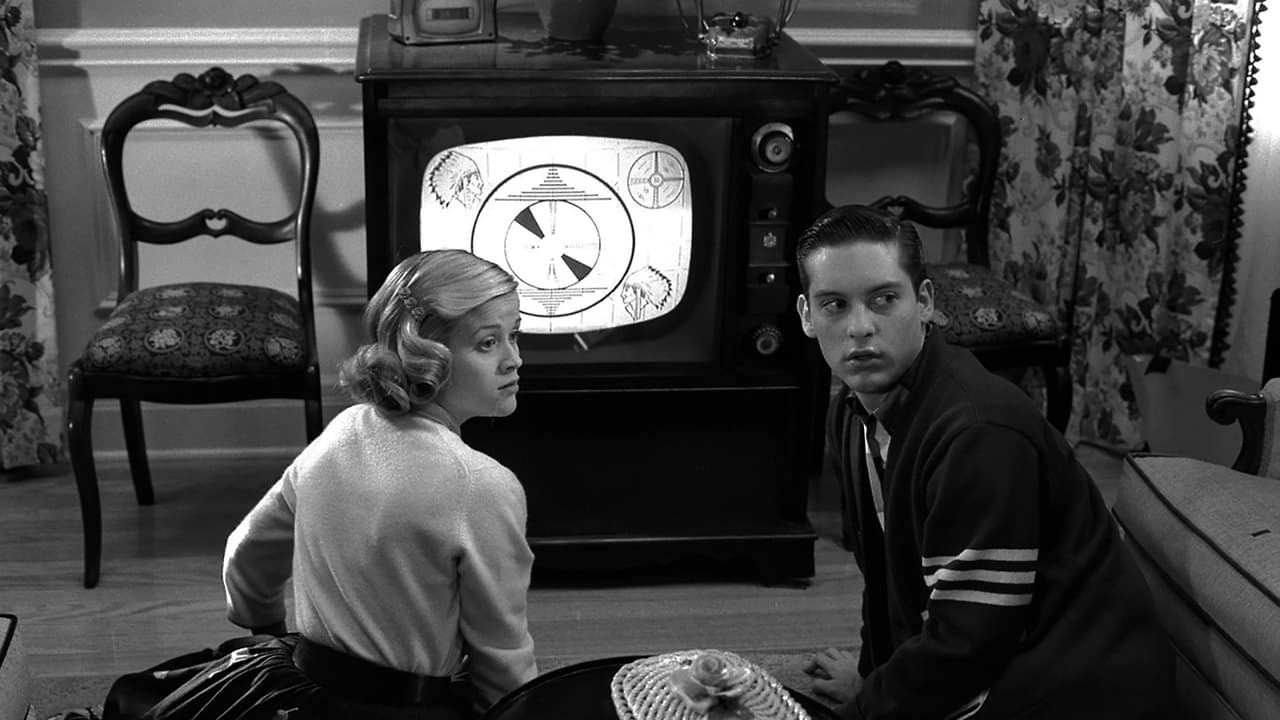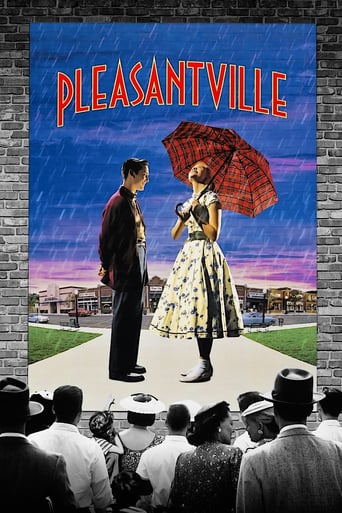

The greatest movie ever!
... View MorePerfect cast and a good story
... View MoreThe film's masterful storytelling did its job. The message was clear. No need to overdo.
... View MoreThe movie turns out to be a little better than the average. Starting from a romantic formula often seen in the cinema, it ends in the most predictable (and somewhat bland) way.
... View MoreIf you scan the list of movies in your local paper, surrounded by all of the vampire movies, action movies, and Halloween thrillers you will find Pleasantville, a charming parable about contemporary society. Gary Ross, who wrote the screenplay for Big, has written and directed one of the more interesting films of the year. Some critics have mistaken it for a movie about the 50's. It is really about social norms, the social order, and the various forms of reality that we construct.The basic premise is simple enough. A brother and sister arguing over a remote control encounter the equivalent of a mass media black hole and wind up in an old 50's sitcom that looks suspiciously like Leave it to Beaver. They discover that they are, in fact, in Pleasantville--the 50's town where all couples have twin beds, nobody on the basketball team misses a shot, and geography lessons are limited to Main Street and Elm Street since there is no existence beyond Pleasantville. As our 90's teens try to adapt to life in Pleasantville, they discover that their awareness of life beyond has the potential to disrupt the social order. Because Pleasantville is a TV town from the fifties everyone in the town is in black and white. But as the presence of the siblings begins to change things in Pleasantville, patches of color begin to show, and other disruptions occur. The malt shop owner discovers his interest in art, people begin to change their routines, and the basketball team begins to miss shots occasionally. But the entire social order falls apart when the TV father of the siblings (wonderfully played by William H. Macy) comes through the door, and announces "honey, I'm home." But this time his wife is not there with martini and dinner waiting.As the changes begin to accelerate, some of the residents of Pleasantville change from black and white to living Technicolor, so that the town is divided between people of color and the rest. Signs that declare "no coloreds" begin to appear in the windows, and the town is clearly divided and threatened with total breakdown of the social order.Some critics have taken this as a poke at the mythical 50's, but I don't think that this is really the point of the film. The fifties did bring us McCarthyism and homogenous suburbs that were largely a result of white flight from urban areas. But the 1950's and the 1990's are just metaphors for larger forces in all societies everywhere. When our need to maintain the illusion of stability and pleasantness leads us to squelch dissent and diversity we end up living a lie. That is the primary theme of Pleasantville. The next century promises to bring even more challenges in terms of culture wars and increasing religious, ethnic, and cultural diversity. In this context, Pleasantville is definitely worth a look. This is a story worth telling and a story well told.
... View MorePleasantvilleThe worst part about being a 1950s housewife was making your bed. Then making your husbands.Mind you, the post-war married couple in this dramedy would enjoy having separate bunks.During a TV marathon of the black-and-white sitcom Pleasantville, high school loser David (Tobey Maguire) and his much cooler twin sister Jennifer (Reese Witherspoon) are magically transported from the free-spirited 1990s to the uptight 1950s.As the siblings navigate their black-and-white surroundings their liberated attitude affects everyone in town, including their sexually repressed parents (Joan Allen, William H. Macy). But as coitus turns townsfolk Technicolor, it begets segregation.A humorous yet powerful allegory on race relations and sexual orientation, this underrated box-office flop from 1998 manages to deliver an array of impactful social messages without getting lost in the science or absurdity of its high concept premise. Incidentally, living inside of a 1950s TV set would give you radiation poisoning. Yellow Lightvidiotreviews.blogspot.ca
... View MoreOne night I had a very unusual dream. I was coming home from my Parochial school on a cloudy afternoon. My bus driver took a different route home and I kept my mouth shut figuring he knew a better way, short cut so to speak. Low and behold we pull up to the House of Samantha Stephens of the popular TV show Bewitched. My Bus driver yelled at me to get off the bus, "This is your house." I'm not one to argue so I stepped off and walked up the driveway with my briefcase in hand and rang the bell. The front door opens and a I get a warm friendly greeting from Samantha as I'm pleasantly in shock but I respond by saying, "Your Elizabeth Montgomery Right?" Samantha with a dumbfounded looks says, "I don't know any Elizabeth whoever but come in and let me take your briefcase." She knew my name but my last name was Stephens? I see Tabatha in the background but alas I had woken into my hum drum world. Reality hit me like a hammer on my thumb. We always feel like the grass is always greener on the other side instead of taking stock in what we have or what we haven't seen on the other side. Pleasantville at the source of this narrative is the perfect Utopia, Garden of Eden,perfect town with perfect people. Tobey Mcquire plays Pleasantville aficionado David who is categorized as a nerd in his high school. Not by any means one of the popular kids in school. Yet David is looking forward to the fictional TV program Pleasantville to air a marathon of episodes starting at 6:30 that evening. Enter popular Blonde,wild,close in age Sister Jennifer (Reese Witherspoon).The two siblings fight over the TV remote which breaks. Our third player is a crusty old TV repair man (Don Knotts) with a most unusual clicker in his possession. One thing leads to another and the two are zapped into the black and white fifties world of Pleasantville. Director Gary Ross goes to tremendous expense to show how a stagnate world can't exist.Ross holds the utopia ideology up for ridicule as the movie wears on. The regulars in this show Joan Allen and husband Bill Macy handle change and awakening in totally different ways. Allen embraces the idea but the husband wants everything status quo. The Hamburger flipping Mr. Johnson played by Jeff Daniels wonders if it's ethical to put cheese on hamburgers and his secret love of art is discovered which give his life more meaning. Each individual gets colorized as an Epiphany occurs within themselves. Discovering one's sexuality seem to change the masses but in Jennifer's case it was the thirst for knowledge and books that changed her. The gradual colorization represented the struggles of racism in that supposed Garden of Eden. As perfect as the Tobey Mcquire was in the fictitious town it was time to come home to present day life. One of the last scenes in the movie is the conversation between David and his real Mom in which she wondered how her life is so screwed up.David's Mom goes on how at one time her life was perfect but David who has lived both sides in and out of the TV box states, "There is no Right House. There is no right car!" To quote a fellow critic Mr. J. Dukes," Sometimes the part of ourselves are the ones we leave unexplored." Great thought provoking movie.
... View MoreGary Ross's Pleasantville is one of the most heartfelt, creative, thought provoking dramedies I've seen in a while. I was floored by its benign, lighthearted first third, which gives way to some unexpectedly deep social commentary, brought to life bu truly remarkable performances, and stunning, storybook cinematography that looks like Sin City had a baby with Rumble Fish. Tobey Maguire, an actor I usually can't stand, is nicely low key, while his sister Reese Witherspoon gets the peppy, in your face persona. Following a terse bit of sibling rivalry, a strange TV repairman shows up, bestowing on them an ancient looking replacement remote. Before they can ask where he even came from, they are magically whisked from their 1990's living room right into TV land, specifically a cheery black and white 1950's sitcom called Pleasentville. They find themselves in a gosh golly, apple pie, white picket fence realm of perky, smiling housewives, rampant celibacy (the characters in this town are essentially shells of humans, and have no idea what sex is...yet;). The naive, mentally stunted townsfolk function at the truncated level that the show's writing is allowed, resulting in strangely robotic, stepford wives like versions of people. That all changes however, when Witherspoon introduces a highschool hunk (Paul Walker, hilarious) to the ol' hanky panky. From there on in the townspeople gradually discover books, music, art, and as such start to see the world in vibrant colors, and become colored themselves. It's a genius idea for a film that's executed perfectly, with some scenarios that really pay off, making you feel and think. J.T. Walsh, always fantastic, plays the town's fearful skeptic of a mayor. William H. Macy nails the father role perfectly (Where's my dinner?!), Joan Allen gives the best work I've ever seen her do, giving force and gentle feeling to the wife who starts exploring herself, and the world around her. The crown jewel acting wise though is Jeff Daniels, as an aloof diner owner who discovers an affinity for the arts. He brings such a warmth and budding humanity to the role. There's subtext relating to Mccarthy-ism, and not letting the powers that be tell how you what to like, how to feel or what to do. There's a lot to enjoy in this package, and indeed all aspects are done so well its a wonder this one hasn't retained acclaim over the years.
... View More